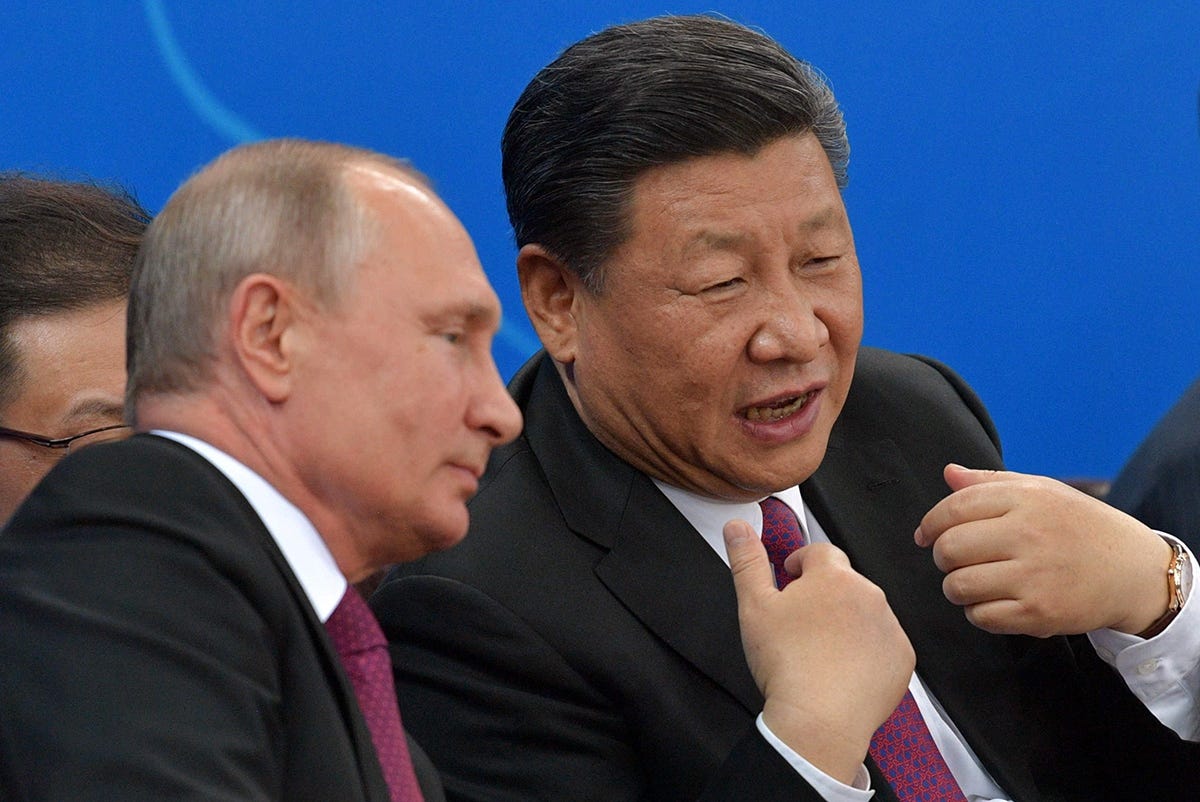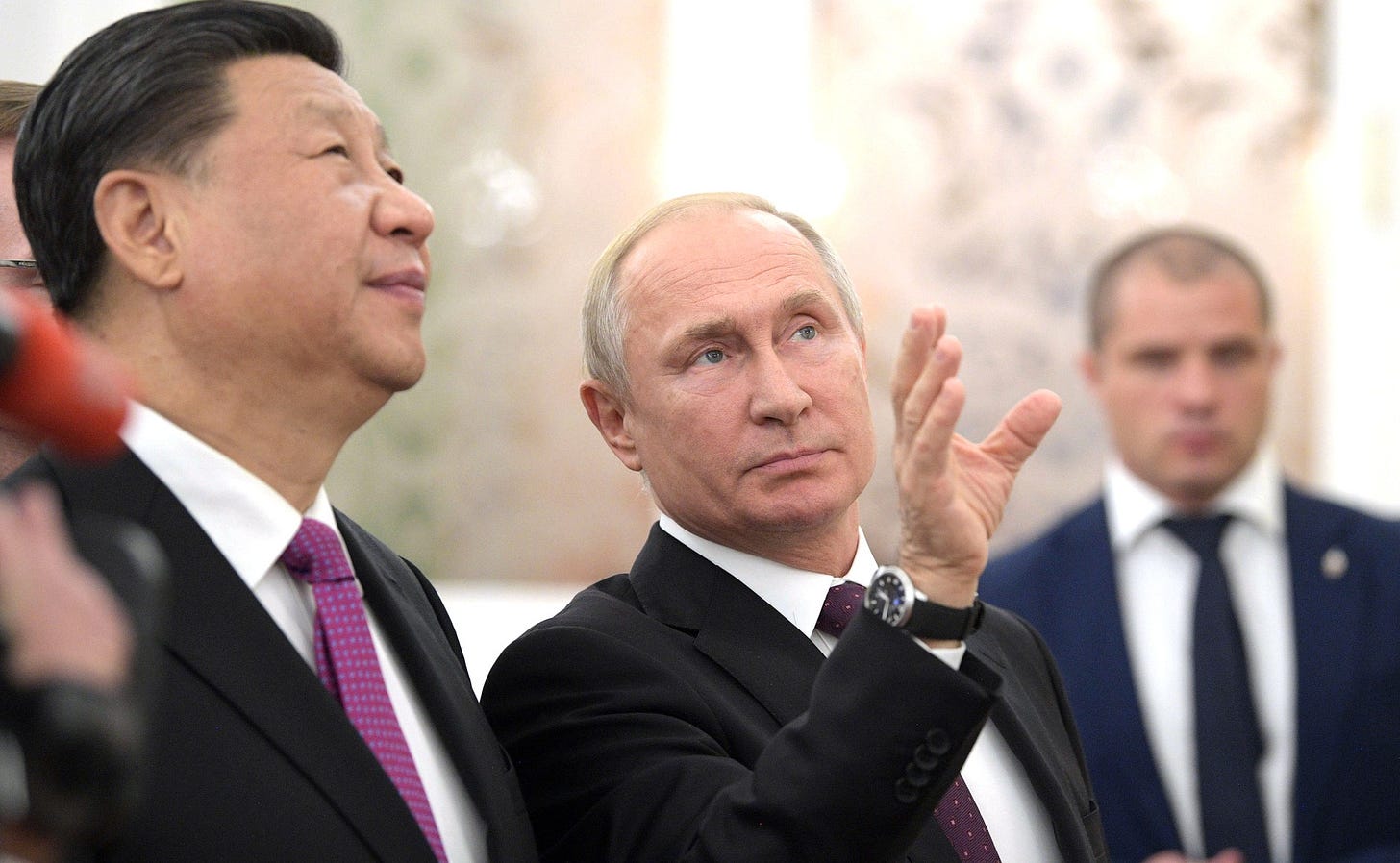Is impossible possible?
Weekend essay, 02.06.2022
According to some experts, Vladimir Putin and Xi Jinping are strenuously demonstrating improved relations between their two countries, which are about to develop into a close alliance. I, however, find this scenario unbelievable: I see no rational motives for such an alliance, nor do I see any possible forms of its manifestation if not taking its PR component into account.
* * *
Xi and Putin are two authoritarian leaders. Each of them came to the top of power in his own way; each of them at some point believed himself to be exceptional; each of them at some point began to reconstruct the political structure in his country to usurp power and keep it in his hands for as long as possible. Putin did this in 2011-2020, first obtaining Constitutional Court approval for his third presidential term and then changing the country’s Constitution to remove the term limit for himself in the Kremlin until 2036. Putin destroyed the political competition in Russia and jailed Alexei Navalny, the only politician who continued to fight him for power. No one doubts that in 2024 Putin will have no problem getting a mandate for the next presidential term.
Xi changed the Constitution in 2018 to remove the restriction on his tenure as President of the PRC, but he has to prove his strength: Elections for the General Secretary of the Communist Party of China will be held this October, and in another year, the PRC President will be re-elected. It can be assumed with a high degree of certainty that Xi carried out a maximum clearance of the CPC Central Committee members who will vote in October, removing from it all those who could seriously compete with him. However, he has yet to confirm this.
Just because the two leaders are driven by usurping and extending personal power does not mean they are similar. The main difference I see between them concerns the vision of the future of their country: Chairman Xi has always had it and crystallized it over time, while President Putin has never had it. All historical analogies are bad, but they are convenient to use. Xi, for me, is a mixture of Yegor Ligachev, the ideologue of the Gorbachev-era Communist Party, who “couldn’t give up his principles” and opposed any changes to the country even though it was obvious to everyone that it could no longer exist as it did, and Yuri Andropov, the Soviet General Secretary who came to power after Leonid Brezhnev and believed that the inefficiencies of the Soviet system could be overcome by bringing order to the country.
Xi wants to see China as a prosperous, wealthy country but believes that China cannot achieve this goal following the “traditional” path of ideological diversity and competition followed by neighboring countries (Indonesia, the Philippines, Vietnam...). This path, in his opinion, leads to the dispersion of forces, to the choice of ineffective solutions in the interests of narrow groups, and, in the end, will deprive China of its independent role in the world, putting it under the influence of the interests of other states. Xi’s supertask is to make China an independent state in every sense of the word, but this can be achieved only if the Chinese Communist Party maintains a monopoly on power.
Without abolishing private property or attempting to separate the Chinese economy from the global economy, Xi proclaimed a “common welfare” course, which entails strengthening the state’s role in regulating the economy and restoring the role of the Communist Party in controlling a more even (in his terminology, “fair”) distribution of income in the country. Moreover, the Communist Party should limit the desire of a stratum of wealthy Chinese to articulate their political interests and gain political representation.
This position is undoubtedly supported by the Communist Party structures, which are ready to give up the prospect of constant upward movement through the regular renewal of the country’s top leadership in exchange for a guarantee of maintaining and strengthening its current power. I think Xi’s desire to preserve the Chinese Communist Party’s monopoly on power has not yet been rejected by the bulk of the population. After all, it was the Communist Party that led China out of poverty and economic ruin in less than 40 years and turned the country into a global factory that became a critical element of the world economy. Forty years is the life of a generation and a half, which means that those Chinese who saw China with their own eyes immediately after Mao Zedong’s death are still alive and understand the journey the country has made during this time.
The demand for a higher standard of living in China remains high. Today more than 400 million people are living in the Chinese countryside, many of whom would like to move to the city. The 200 million people who live in Chinese cities have moved there in the past 10 years and obviously dream of a better life, too. They have seen with their own eyes how life in the country has changed, and they are willing to give a mandate to the Communist Party in the hope of continued rapid economic growth.
To summarize, Xi relies on a large segment of the population that remembers the past, has seen rapid growth, and wants it to continue.
Vladimir Putin and Xi Jinping are the same age, only 251 days apart by birth date. So it is not surprising that the five-year period of 1975-1980 is a point of reference for each of them. It was when they were both entering adulthood, the time when their worldview was being formed. But while China was at the lowest point in its development, for the Soviet Union, it was arguably a time of flourishing. The economy continued to grow. The discovery of oil fields in Western Siberia made it possible to replenish the budget. The Soyuz-Apollo co-flight created a semblance of technological parity with the Western world. America at the time was bogged down in economic problems generated by the Vietnam War and had lost its political stability (student and race riots in 1968—Spiro Agnew’s resignation—Richard Nixon’s resignation—Gerald Ford’s short presidency—the seizure of the American embassy in Iran). All this in the Soviet Union was called “a new phase of the general crisis of capitalism,” and it seemed that the victory of communism was not so far off.
This euphoric and romantic “point of reference” played a cruel joke on Vladimir Putin, who happened to be in power. For him, as for many of his peers, the period of the 1980s-90s was a period of decline of the great state. He was unable or unwilling to link the collapse of the Soviet Union with the faulty construction of the Soviet system, doomed to collapse. He decided to blame everything on his predecessors—Gorbachev and Yeltsin.
At the beginning of his presidency, Putin tried to formulate a plan for the transformation of the country, based on international experience—the result was the “Gref Program.” But very soon, this plan was tossed aside as a result of a fair amount of political luck: Putin came to power at practically the lowest point of Russia’s transformation decline, and at the very beginning of his presidency he was rewarded with the fruits of the reforms of the previous decade and the favorable economic situation, as shown by the rapid growth of the economy in the early 2000s. Putin saw that the economy was rapidly improving without difficult and painful systemic reforms.
But, as the saying goes, the place is never empty. The rejection of the ideology of reforms and the continuation of the transformation toward the European model of the state led to the fact that the dominant motive of many decisions was an intuitive desire “to go back to the beautiful ’70s,” which found support among those segments of the population who felt they had lost out in the years of reform. In Putin’s vocabulary, “the wild ’90s,” “the greatest geopolitical catastrophe of the 20th century,” and “the crisis of the modern model of capitalism” took center stage. At the same time, the idea of restoring Russia’s greatness, promoted by his propaganda machine, found fertile ground in the public consciousness.
But no matter how good yesterday was, it is impossible to bring it back. Life goes forward; things change around us, and the schemes and designs that worked yesterday become ineffective today. Vladimir Putin has not dared to restore the communist ideology (evidently realizing very well that the population will not accept it) and has not found any substitute for it, without which it is very difficult to paint an attractive future for society. Denial of the effectiveness of the economic system of developed countries, built on private property and private initiative, has given rise to creeping nationalization and increased government control over the business. However, the attempt to replace the framework of the Soviet administrative system (which was the structure of the Communist Party) with a vertical power structure based on the security services and fear led to the destruction of the entire legal system of the state and the transformation of security officials into racketeers.
As a result, the return of episodic elements of the Soviet system—the elimination of political competition, administrative control of property rights, military confrontation, and the technological break with the West—has blocked movement forward but not set an alternative vector. The economy has lost its growth momentum, people’s incomes have stopped expanding. Of course, the inefficiency of Putin’s economic system does not mean that it is unsustainable. High commodity prices make it easy to maintain macroeconomic equilibrium and a stable budget and to finance defense and infrastructure projects. Still, all this hardly compensates for the lack of private investment. The economy’s dependence on raw material exports is growing, while the economy is not producing any new globally competitive goods or technologies.
* * *




